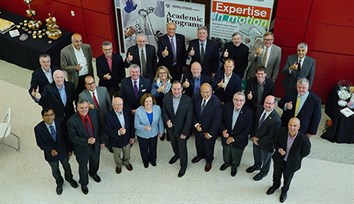
The Engineering Genesis Award for Multidisciplinary Research was presented to 14 Texas A&M Engineering Experiment Station (TEES) researchers and their research teams during the TEES External Advisory Board (pictured right) meeting Nov. 10.
The award, which is presented to TEES researchers who have secured significant research grants of $1 million or more, were given to the following:
PI: Karen Kirkland, nuclear engineering. Co-PIs: Abhay Patil, mechanical engineering, and Yassin Hassan, nuclear engineering
- $1 million grant from the Institute of Applied Energy to study the expanded operation limitations of the Terry turbopump systems.
PI: Perla Balbuena, chemical engineering. Co-PIs: Jorge Seminario, chemical engineering; and Partha Mukherjee, mechanical engineering.
- $1.2 million grant from the Department of Energy (DOE) Vehicle Technology Office for their project, “Understanding and Strategies for Controlled Interfacial Phenomena in Lithium-Ion Batteries and Beyond.”
PI: Jim Morel, director, TEES Center for Large-scale Scientific Simulations (CLASS). Co-PIs: Marv Adams, nuclear engineering; Jean-Luc Guermond and Bojan Popov, mathematics.
- $1.4 million grant from the Lawrence Livermore National Lab for his project, “Computational R&D in Support of Stockpile Stewardship.”
PI: Bahman Yazdani, associate director, TEES Energy Systems Lab. Co-PIs: Joseph Martinez, Carlos Yagua and Juan Carlos Baltazar, Energy Systems Lab.
- $1.4 million grant from Metco Engineering Continuous Commissioning, funded by the Texas Comptroller for designing and implementing a cost-effective, energy efficiency program for 35 City of Dallas facilities.
PI: Jim Morel, director of CLASS. Co-PIs: Nancy Amato and Lawrence Rauchwerger, computer science and engineering; Raymundo Arroyave, materials science and engineering; Amine Benzerga, aerospace engineering; Marv Adams and Jean Ragusa, nuclear engineering; and Jean-Luc Guermond, mathematics.
- $1.5 million grant from the Lawrence Livermore National Lab for his project, “Collaborative R&D in Support of LLNL Missions.”
PI: Bryan Rasmussen, mechanical engineering. Co-PI: James Eggebrecht, associate research engineer, TEES Energy Systems Lab.
- $1.5 million grant from the DOE to set up the Texas A&M University Industrial Assessment Center, which will train engineering students on how to successfully apply energy conservation techniques in real-world situations.
PI: Xia Hu, computer science and engineering. Co-PI: Eric Ragan, visualization.
- $1.6 million DARPA grant, “Transforming Deep Learning to Harness the Interpretability of Shallow Models: An Interactive End-to-End System.”
PI: Luc Vechot, Co-PI: Tomasz Olewski.
- $1.6 million grant for the SABIC Process Safety Competency Development Program, Saudi Basic Industries Corporation.
PI: Radu Stoleru, computer science and engineering. Co-PI: Walt Magnussen, director of the Internet2 Evaluation Center and the Academy of Telecommunications and Learning Technologies.
- $1.8 million grant from NIST for his proposal, “DistressNet-NG: Next Generation Resilient Mobile Broadband Communication.”
PI: Rodney Bowersox, aerospace engineering. Co-PIs: Ed White and Kristi Shryock, aerospace engineering; Jeff Froyd, engineering education; and Issac Sabat, psychological and brain sciences.
- $1.9 million grant from the National Science Foundation to dramatically improve the diversity, inclusion and quality of undergraduate students, graduate students and faculty members in the Department of Aerospace Engineering at Texas A&M University.
PI: Melissa Grunlan, biomedical engineering. Co-PIs: Michael Moreno, mechanical engineering; Brian Saunders and Roy Pool, veterinary medicine and biomedical sciences; and Mariah Hahn, Rensselaer Polytechnic Institute.
- $1.9 million from the National Institutes of Health for “Bioactive, Self-Fitting Shape Memory” to develop material designed to precisely fill and promote healing of cranial bone defects and gaps in the skull.
PI: Mladen Kezunovic, director,TEES Smart Grid Center. Co-PIs: Steven Liu, computer science and engineering and Alex Sprintson, electrical and computer engineering.
- $4.4 million DOE grant for TIMER, “Timing Intrusion Management Ensuring Resiliency,” to develop next-generation cybersecurity solutions, and enhance the reliability and resilience of the nation’s critical energy infrastructure.
PI: Dimitris Lagoudas, TEES deputy director. Co-PIs: Helen Reed, Rodney Bowersox, Paul Cizmas, Christopher Limbach, aerospace engineering; Richard Malak, mechanical engineering; and Ibrahim Karaman, materials science and engineering.
- $10 million as part of NASA University Leadership Initiative to design commercially viable civil supersonic transport (SST) aircraft that can modify shape during flight under a range of conditions to meet noise and efficiency requirements for overland flight.
PI: Gerard Cote, biomedical engineering. Co-PIs: Bala Haridas, Kristin Maitland, Roozbeh Jafari and Javier Jo, biomedical engineering; Ricardo Gutierrez-Osuna, computer science and engineering; Lee Hudson, Center for Remote Health Technologies and Systems; Mark Lawley, industrial and systems engineering; Arnold Vedlitz, Bush School of Government and Public Service; and Nicolaas Deutz, health and kinesiology.
- $19.5 million for PATHS-UP: Precise Advanced Technologies and Health Systems for Underserved Populations (PATHS-UP), which was created to develop advanced technologies to prevent, delay the onset, and manage diabetes and cardiovascular disease. Partner institutions include Florida International, Rice University and UCLA, along with several companies and federal agencies.
